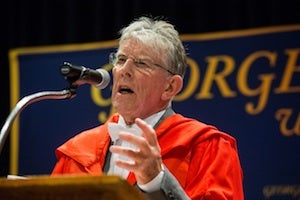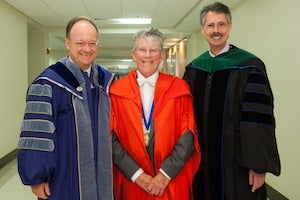GUMC Convocation Heralds ‘New Wave’ of Health Education

Posted in GUMC Stories
 Georgetown University Medical Center (GUMC) celebrated the accomplishments of faculty and students at its annual fall Convocation Nov. 12.
Georgetown University Medical Center (GUMC) celebrated the accomplishments of faculty and students at its annual fall Convocation Nov. 12.
This year’s theme, interprofessional health education, was carried throughout the events of the week, the focal point being the Convocation awards ceremony Tuesday afternoon. There, Georgetown bestowed its highest honor, the Cura Personalis Award, to Ronald Harden, MD, a global leader in medical education, and honored faculty members and students for achievements in research, education and service.
Among the list of other honorees, Christopher Wilcox, MD, PhD (new window), was recognized for leadership in research, and Anatoly Dritschilo, MD (new window), received the award for lifetime contribution to GUMC.
A complete list of awardees can be found here. (new window)
Howard J. Federoff, MD, PhD (new window), executive vice president for health sciences at GUMC, was joined by Georgetown University President John J. DeGioia, PhD, in presenting the awards.
Future of Health Care
In introducing Harden, Federoff said that interprofessional health education, as well as coordinated care among health care practitioners, is where the future of patient care must lie.
“If nursing and medical and health professions students can learn jointly in clinical settings, then as graduates, they will improve patient outcomes,” Federoff said.
Achieving such coordination and breaking down silos will not be easy, but the time to act is now, he continued.
“With the implementation of the [Affordable Care Act], there is a renewed emphasis on access to affordable, high-quality health care for millions more people. And in order to serve those needs, interprofessional, team-based education and care must take hold,” Federoff said.
Transformative Vision
 Harden, who delivered the keynote lecture, challenged the audience to consider whether the future needs of medical education require an evolutionary approach or more of a dramatic shift — a “revolution” in medical education. Changes in education have not kept pace with fundamental changes in clinical practice, requiring a bold, “transformative vision” for how health care practitioners are trained, he said.
Harden, who delivered the keynote lecture, challenged the audience to consider whether the future needs of medical education require an evolutionary approach or more of a dramatic shift — a “revolution” in medical education. Changes in education have not kept pace with fundamental changes in clinical practice, requiring a bold, “transformative vision” for how health care practitioners are trained, he said.
“We need a new wave of education – this is the challenge,” Harden said. “When the medical student of the future, yet unborn, meets the medical curriculum, yet unwritten, what will they experience?”
“Too often we simply use the new technologies that become available to improve what we are doing at the moment. We need to … do things we’ve never done before,” he said.
Harden highlighted four areas of transformation to usher in a new era of education: a move to adaptive, personalized learning that meets the needs of students; more collaborations and interconnections locally, nationally and globally; a true continuum of education to break down silos; and the recognition of the professionalism of teaching and scholarship.
“We need to recognize professionalism, and that scholarship of teaching and learning is a reality. The establishment of CENTILE here is recognition of this professionalism,” Harden said, referring to the Center for Innovation and Leadership in Education at GUMC that was established earlier this year.
Under the leadership of Aviad Haramati, PhD, professor in the department of biochemistry and cellular & molecular biology, CENTILE organized and co-sponsored events designed to complement the interprofessional theme the week of Convocation, including a seminar, workshop and medical education grand rounds.
‘Knowledge is Too Complex’
On the morning of Convocation, Federoff moderated a colloquium on the importance of interprofessional education.
Along with Harden, the dynamic panel discussion featured leaders in health professions: John Prescott, MD, chief academic officer, Association of American Medical Colleges; Geraldine “Polly” Bednash, PhD, RN, FAAN, executive director, American Association of Colleges of Nursing; and David P. Sklar, MD, editor-in-chief of Academic Medicine.
The panel discussed the importance of teamwork and trust in the clinical – and how to implement a new training paradigm to achieve these goals.
Bednash noted that lessons from the airline industry and the U.S. Navy, for example, have shown that “teamwork and including everyone in the decision process has an impact on safety and quality.”
“We live in a world where knowledge is too complex. None of us can own all the knowledge about delivering care,” Bednash said. “Each of us has to be in the game – it takes a complete village to deliver the care our patient and our community deserve.”
By Lauren Wolkoff, GUMC Communications
